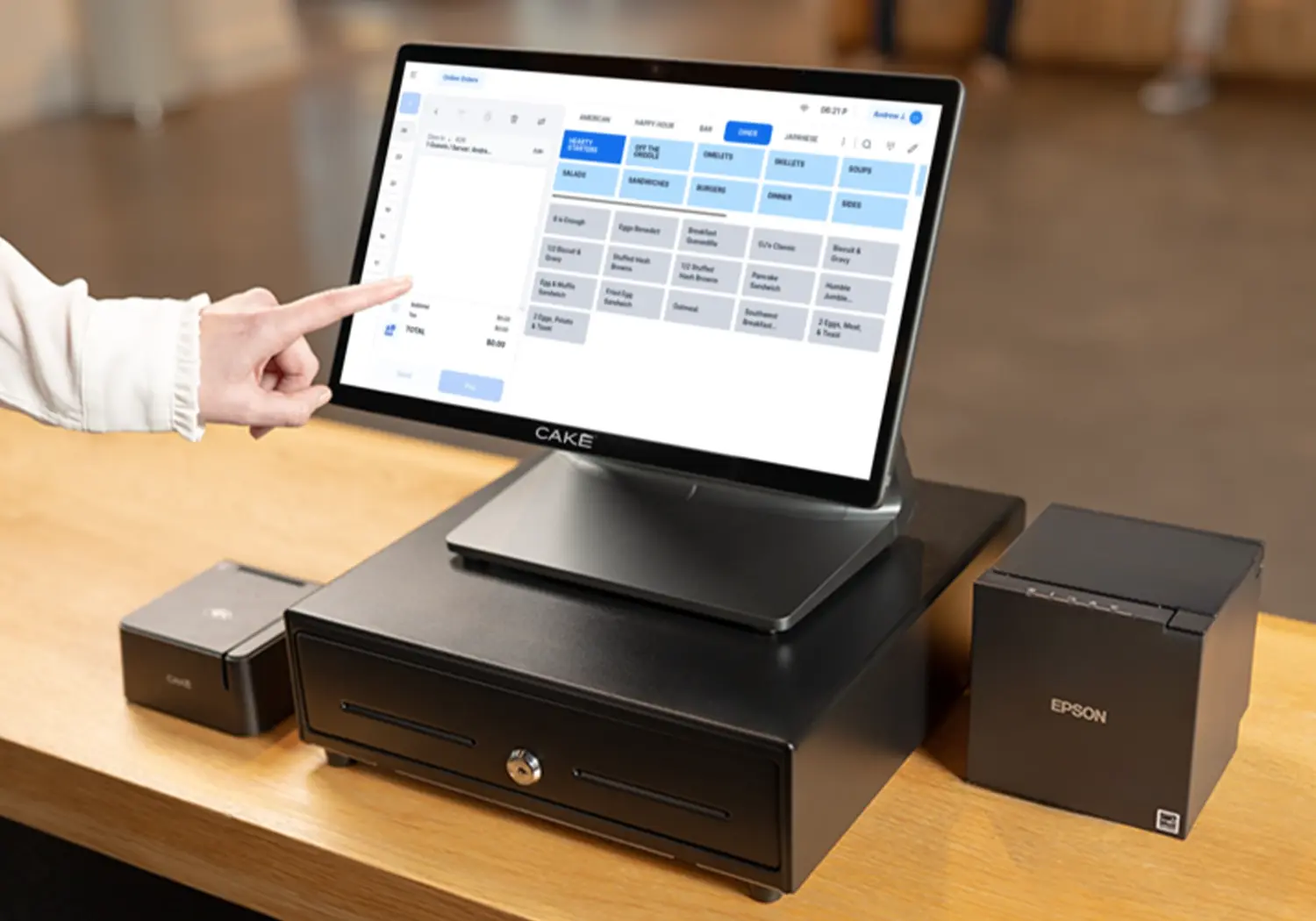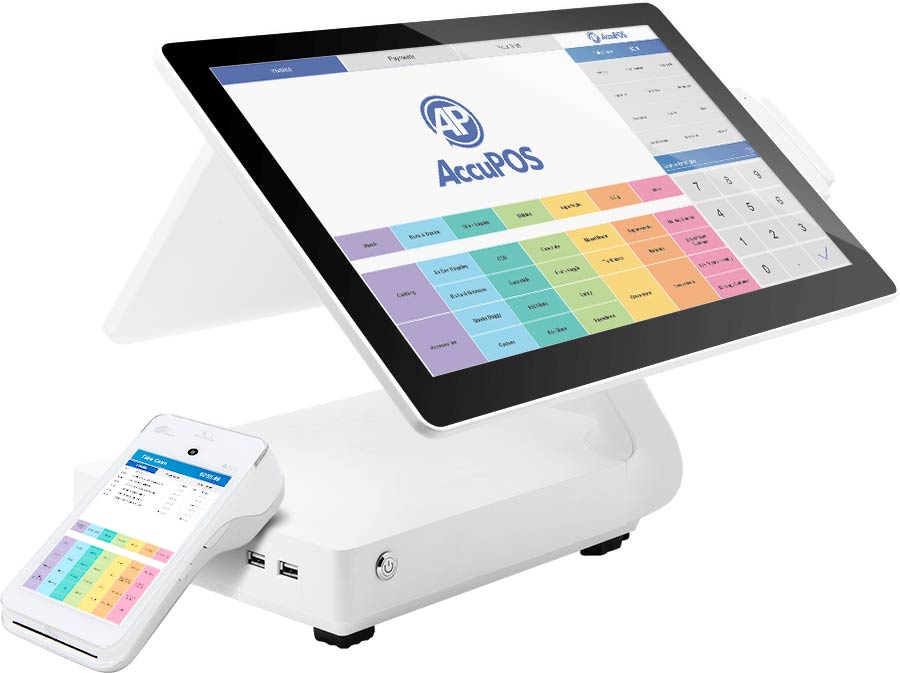The Ultimate Guide To Restaurant Pos
The Ultimate Guide To Restaurant Pos
Blog Article
Facts About Point Of Sale Software Revealed

Restaurant POS: Retail Point-Of-Sale Solutions Streamline Deals
Restaurant Pos for Beginners

Hardware Components of a Point of Sale System What makes a POS system tick? It's not just software; the hardware plays a starring role. Believe of it as the body to the software application's brain. Without the ideal hardware, even the most sophisticated POS software application is just a pretty face. Important POS Hardware So, what are the must-haves? Let's simplify. The central processing system, typically a computer system or tablet, is the heart of the operation. The display or touchscreen display permits personnel to communicate with the system. A barcode scanner speeds up the checkout procedure. Remember the days of manually entering each code? The reliable invoice printer offers customers with a record of their purchase. A money drawer keeps your cash safe and arranged. A card reader permits clients to pay with credit or debit cards. Diving Deeper: Beyond the Fundamentals But wait, there's more! Depending on your business, you might require customized hardware. A dining establishment may integrate kitchen printers to relay orders, while a retail store may use label printers for item tagging. Ever question how your regional bakery immediately prints those delicious-looking labels? Selecting the Right Hardware: A Balancing Act Choosing the ideal hardware isn't almost buying the most pricey devices. It has to do with finding the sweet spot between functionality, sturdiness, and spending plan. A little business just starting out might select a more standard setup, while a high-volume retailer will require robust, high-performance devices. Is it much better to buy brand-new or utilized? Consider your options thoroughly. A new system provides the latest innovation and warranty protection, but a refurbished system can save you cash. The Future of POS Hardware What does the future hold? Expect to see a lot check here more combination with mobile devices, biometric scanners for worker authentication, and advanced analytics dashboards displayed on larger, clearer screens. Think of a world where inventory is automatically upgraded in real-time as items are scanned-- a world where you can track your very popular product from anywhere in the world. The possibilities are endless, and the hardware is constantly evolving to fulfill the demands of today's services. Are you prepared to update your point of sale system?
Software Features and Capabilities: The Heart of Your POS System
Ever see a seasoned barista slide through a hectic morning rush? Their trick isn't simply caffeine; it's a seamless dance with their POS system. The software application is the conductor of your company symphony, managing everything from sales to inventory. What notes should you be listening for? What capabilities genuinely matter in today's market?
Stock Management: Beyond Counting Beans
Forget spreadsheets that haunt your dreams. Modern POS systems offer real-time inventory tracking, informing you when your stock of artisanal coffee beans dips precariously low. Think about it as a digital guardian angel, preventing those awkward "Sorry, we're out!" minutes to customers. What if you could likewise anticipate need based upon historical information? Many systems now provide forecasting tools, a powerful weapon versus overstocking and lost sales. This helps prevent the circumstance of lacking popular items or building up excess stock of slow-moving products, both of which can constrain money circulation and area.
Sales Reporting and Analytics: Translating the Information
Sales data is the brand-new gold, and your POS system is the miner. Forget feeling in one's bones just how much you offered today. Dive deep into the information to uncover patterns, recognize your best-selling products, and comprehend customer habits. Which menu item pairs completely with the everyday special? Which promo resonated most with your customers? These insights are not simply intriguing; they're actionable intelligence. Without reputable sales reporting, browsing the complexities of service decision-making becomes like cruising without a compass, increasing the opportunity of missteps and missed out on chances.
Customer Relationship Management (CRM): Structure Bridges, Not Walls
Keeping in mind a routine customer's name and favorite order is captivating, but scaling that individual touch is challenging. POS systems with CRM capabilities allow you to track client purchase history, choices, and even birthdays. Think of instantly using a discount on their birthday-- a small gesture that cultivates commitment and encourages repeat company. However there is the prospective snag of bad information quality, which can result in incorrect consumer profiles and inadequate marketing efforts.
Payment Processing: Streamlining the Deal
The checkout experience can make or break a sale. Seamless combination with different payment techniques-- credit cards, mobile wallets, even copyright-- is non-negotiable. Can your system handle split payments? Does it provide protected tokenization to protect client information? A clunky payment procedure is like striking a sour note in your service symphony, possibly interfering with the entire efficiency. Ensuring compatibility with evolving payment technologies and adherence to security standards are critical for maintaining customer trust and functional effectiveness.
Staff Member Management: Keeping the Team in Sync
From clocking in and out to handling authorizations and tracking performance, worker management includes streamline operations and improve responsibility. Is scheduling a headache? Many POS systems use incorporated scheduling tools, enhancing staffing levels based on anticipated need. A common barrier that is often neglected is the challenge of incorporating employee management performances with payroll systems, which can result in errors and ineffectiveness in wage estimations.
Advanced Features: Leveling Up Your Operations
- Table Management: Perfect for dining establishments, this feature allows you to envision your dining space, track table status, and manage reservations.
- Commitment Programs: Reward your finest clients and motivate repeat business with integrated loyalty programs.
- Online Ordering Integration: Perfectly incorporate your POS system with online buying platforms to broaden your reach.
Choosing the ideal POS system is about more than just performance; it has to do with finding a partner that can grow with your company. Consider your current needs, prepare for future development, and do not be scared to ask the tough questions. The best software can transform your business from a chaotic cacophony into a harmonious work of art.
Industry-Specific POS System Applications
Think about the local pastry shop, bustling with early morning clients yearning fresh croissants. A generic POS system might manage transactions, but can it manage intricate recipes, track active ingredient inventory, or automatically adjust production schedules based on sales information? Probably not. That is where the beauty of industry-specific POS systems shines.
Dining establishments and Hospitality
For bustling dining establishments, speed and precision are critical. The number of times have you seen servers juggling orders, modifications, and splitting expenses, all while trying to offer exceptional service? A dining establishment POS system improves these processes, permitting table management, kitchen area order tickets, and even online buying integration. These systems typically consist of features like ingredient-level stock tracking, vital for handling food expenses and minimizing waste. Ever question why your favorite dish is sometimes unavailable? It might originate from a lack of correct stock management.
- Table Management
- Kitchen Area Order Tickets
- Online Buying Combination
- Ingredient-Level Stock Tracking
Retail Solutions
Retail, with its varied stock and client interactions, requires a different set of tools. Picture a store clothes shop having a hard time to monitor sizes, colors, and seasonal collections using a fundamental checkout system. An industry-specific retail POS system provides functions like barcode scanning, client commitment programs, and detailed sales reporting. These systems can even incorporate with e-commerce platforms, supplying a seamless omnichannel experience for customers. Did you understand some retail POS systems can anticipate future sales patterns based on historic data? Now that is effective!
The Hazards of a Mismatch
Selecting the incorrect POS system can produce substantial operational hurdles. A clothes boutique using a dining establishment POS, for example, would discover it inappropriate for handling inventory with sizes and colors. The absence of correct reporting and analytics could lead to misinformed getting decisions and lost earnings. The result might be similar to trying to fit a square peg in a round hole.
Secret Factors to consider
Selecting an industry-specific POS system requires careful assessment. Think of your company's special needs and operational workflows. Does the system integrate with existing software? Does it offer the required reporting capabilities? Is it scalable to accommodate future development? A well-chosen POS system is not simply a transaction tool; it's a strategic possession that can drive effectiveness, improve client satisfaction, and ultimately, enhance your bottom line. Keep in mind, it is an investment in your company's future, not just an expenditure.
Security Considerations for Point of Sale Systems
Ever heard the tale of the mom-and-pop store that lost whatever because of a single, overlooked security flaw in their POS system!.?. !? It's a cautionary tale, and it highlights an important aspect often eclipsed by the allure of elegant features and structured operations. The reality is, a POS system is just as excellent as its security. What excellent is a system that crunches numbers in a flash if it permits criminals to swipe customer's data just as rapidly?
The Vulnerability Minefield
The digital landscape is a battlefield. Every POS system, no matter size or elegance, is a prospective target. Are you truly got ready for the hazards prowling around the corner? The real pinch comes when you discover that your outdated software application has a gaping hole that hackers can make use of, turning your service into an unwitting accomplice in identity theft. The problem is that hackers are crafty and are always changing their strategies.
Typical Security Spaces and Professional Tips
- Weak Passwords: "Password123" isn't cutting it. Usage strong, special passwords for all POS system accounts and change them regularly. Two-factor authentication is a must.
- Unsecured Networks: Your Wi-Fi resembles leaving the front door open. Protect your network with strong encryption (WPA3 if possible) and consider a different network for your POS system.
- Outdated Software Application: Software suppliers patch security holes all the time. Stopping working to update is like inviting difficulty. Set up automatic updates or schedule regular maintenance.
- Staff member Training: Your staff is your very first line of defense. Train them to acknowledge phishing efforts, safeguard passwords, and report suspicious activity.
Information Encryption: Your Shield Versus the Dark Arts
Think about information encryption as a secret code. It scrambles delicate info, like credit card numbers, making it unreadable to unauthorized users. Without encryption, your clients' monetary information resemble sitting ducks, ripe for the selecting by cybercriminals. It's not almost securing your customers; it's about safeguarding your reputation and preventing substantial fines.
PCI Compliance: The Rulebook You Can't Neglect
If you accept charge card, you're bound by the Payment Card Market Data Security Requirement (PCI DSS) It's a set of security standards developed to secure cardholder information. Stopping working to comply can result in fines, charges, and even the loss of your capability to process credit card payments. It's a headache, yes, however it's a needed one. Think about PCI compliance as the expense of doing organization in the digital age.
Consider this: every transaction processed through your point of sale is a potential entry point for malicious actors. By carrying out robust security steps, you're not just protecting your organization; you're safeguarding your clients' trust and making sure the long-lasting practicality of your operations. The security of your POS system isn't just a technical concern; it's a service necessary. It needs continuous caution, proactive procedures, and a dedication to remaining ahead of the curve.